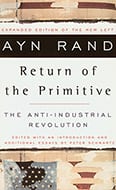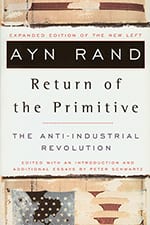This essay was originally published in the February 1970 issue of The Objectivist and later anthologized in The New Left: The Anti-Industrial Revolution (1971) and Return of the Primitive: The Anti-Industrial Revolution (1999).
If you happened to see Sign of the Pagan, a very bad movie recently shown on television, dealing with Attila’s invasion of Europe, you may have noticed that Attila kept an astrologer by his side, as his only adviser, and consulted him before undertaking every bloody new campaign. You may have felt a touch of superiority (which Western man took fifteen centuries to earn), best expressed by the sentence: “It can’t happen now.” You may have regarded the reliance on astrology as crude, primitive or amusing, but quite appropriate to Attila; besides, he had nothing but clubs and swords to devastate the world with.
Would you find it amusing if you saw the same Attila balancing a nuclear bomb in the palm of his hand and consulting the astrologer on whether to toss it?
Well, you can see it or, rather, you can hear it being announced in advance and welcomed, not in the scriptures of the Huns, but in a magazine regarded as safely reputable, read by respectable commuters of the somewhat conservative type — not in A.D. 450, but in Time magazine on December 19, 1969.
A piece entitled “The Next Decade: A Search for Goals” begins by invoking the sanction of astrology, as justification for its prophecies about the coming decade. The present motion of the planet Neptune, it seems, is a “sign of idealism and spiritual values,” which will work “a profound change” in people’s ways of thinking and acting.
“Just possibly,” declares — no, not Attila’s adviser, but Time magazine, “the astrologers may be proved right. . . . In the long run, this decade and the next may well constitute an historical era of transition, like that which followed the Middle Ages and preceded the Renaissance.
“The veneration of rationality was the special myth of modern man. The world view created by the enthronement of reason included a universal belief in individualism and competition; now that myth is dying. Faith in science and technology has given way to fear of their consequences . . . The cultural revolution of the ’60s that emphasized Dionysian rather than Apollonian virtues will continue into the ’70s.”
Nothing but astrology could justify a statement of this kind. It is embarrassing to have to comment on it. But for the benefit of the very young, I will point out a few things that should be almost self-evident.
The Middle Ages were an era of mysticism, ruled by blind faith and blind obedience to the dogma that faith is superior to reason. The Renaissance was specifically the rebirth of reason, the liberation of man’s mind, the triumph of rationality over mysticism — a faltering, incomplete, but impassioned triumph that led to the birth of science, of individualism, of freedom.
I have no way of knowing whether Time’s statement came from ignorance or worse. I know only that when I advocate the supremacy of reason, I do not equate it with a historical period exemplifying its opposite. But this is an Apollonian, not a Dionysian, virtue.
There is one element of truth in that quotation and it is interesting to find such an admission in such a context: the fact that reason leads to (and is the foundation of) individualism and competition, i.e., capitalism. Capitalism’s enemies know it. Its alleged friends are still twisting themselves into double-jointed pretzels in the struggle to evade that knowledge.
Let me also remind you that reason is the faculty that identifies and integrates the material provided by man’s senses — i.e., that reason is man’s only means of grasping reality and of acquiring knowledge — and, therefore, the rejection of reason means that men should act regardless of and/or in contradiction to the facts of reality.
One of these facts is the existence of nuclear weapons. If men discard “the myth of rationality,” by what means will they decide whether to use these weapons, when, where and against whom? They will have nothing but their Dionysian “instincts” and their astrologers to guide them. Attila was a piker compared to a prospect of this kind.
This does not seem to deter the Time prophet, who speaks of the fear engendered by the “consequences” of “science and technology.” Nuclear weapons are his ideological brothers’ main reproach against science and their main instrument of intellectual terrorization. But if this, in fact, were their fear and their motive, they would have become passionate advocates of reason overnight: they would have known that a hydrogen bomb cannot descend on a city of its own volition — and they would have known that for this reason, among many others, mankind cannot afford irrationality any longer. But that is not their fear or their motive.
“It is possible,” Time goes on, “that the hippie may have pioneered — in spirit, at least — the way men will live and think [?] in the next decade. . . . Individualism may continue to wane as men seek personal identity in group identity . . . Marshall McLuhan predicts confidently: ‘We are going through a tribal cycle once again, but this time we are wide awake.’”
How one manages to be “wide awake” when one has rejected reason, and how one can describe as “wide awake” the specifically out-of-focus, zombie-like state of trance characteristic of and necessitated by a tribal mentality, Time does not explain. It is only Apollonians, not Dionysians, that require explanations.
“While industrial technology will provide a dazzling variety of innovative gadgets, from phonovision to computers for the home, possession will be less of an ideal. When goods are needed, says Buckminster Fuller [a bright young man of 75], more and more will be rented rather than bought. ‘Ownership,’ says Fuller, ‘is obsolete.’”
Another youthful authority, the Harvard sociologist Pitirim Sorokin, predicted, according to Time, that “the U.S. will become a ‘late sensate society’ . . . By this he meant the glorification of pleasure over Puritan duty, of leisure over work.” Mr. Sorokin, a thoroughly Russian mystic-altruist, was born in 1889. The youngest of these rebels and trend-setters for youth is Marshall McLuhan, aged 59. l suppose when one writes under the aegis of astrology, one cannot be too choosy about the sort of authorities one quotes. But the hippies should observe who molded their docile minds and plastic souls, and how much novelty or originality is contained in the moth-eaten notions they spout.
“Education for enrichment or amusement,” Time marches on, “rather than for professional skills will become a lifetime process . . . In fact, says Marshall McLuhan, older people will have to go back to school to learn basic skills. The young, he says, are not interested in the mundane knowledge it takes to run a technological civilization; the old will have to learn it if they are to keep their world running.” Why should they want to? What if they shrug? No answer is given.
Time is not indifferent, however, to the continuation of that world. “All this [the Dionysian Utopia of the future],” the article declares, “will depend on the continued expansion of the U.S. economy, which virtually all experts agree will take place. . . . Business will be operating in a new, probably tougher atmosphere. While profit will still be the prime mover, some of the money once considered the stockholders’ will have to be sacrificed to the needs of society and to pollution control.”
Further on, a faint note of apprehension creeps into the euphoric prophecy: “It may be that the early ’70s will see a period of repressive reaction against the Dionysian tendencies of the young. . . . It is possible, too, that a decline in the work ethic or a weakening of demand for material goods may disrupt the foundation of a hedonist civilization — the economy.”
After considering this possibility for two paragraphs, Time concludes: “Possible — but not likely, for at least the greater part of the decade.” Observe the length and range of concern of these supposedly responsible social commentators. What is to happen after a decade of that kind? It is only Apollonians who look that far; Dionysians do not and cannot.
As for other predictions: “The most significant trend of the ’70s may well be a religious revival. . . . In reaction against the trend toward secularization [i.e., toward rationality], there may well be a sweeping revival of fundamentalism, particularly in its fervent, Pentecostal variety. . . . Many people will reject traditional Western religions, finding inspiration and solace in the mystery cults of the East or in eclectic spiritual systems of their own devising. . . . For many, astrology, numerology and phrenology will become no longer fads but ways of life.”
As to art: “The changed atmosphere will affect the arts as well, which may become ephemeral, instant, faddish and ultimately disposable.” Here the prophet is confessing his estimate of the arts of the present by projecting it into the future. Except for the wrong tense, the estimate is right. “Ephemeral, instant, faddish and ultimately disposable” is a euphemism for: junk that cannot last overnight, is not needed by anyone, has no value but that of clique-press-agentry, and ultimately belongs in the trash can.
In the ugliest form, this is a confirmation of the metaphysical nature of art: Dionysian brutes who reject reason and live on the sensations of the immediate moment have no capacity for a metaphysical view of life and no need of art, beyond the Halloween masks or New Year’s Eve hats that the charwomen of history will sweep up wearily the next morning.
Under the subtitle “Man and Environment,” a lengthy section of the Time article is devoted to the subject of pollution. “Government and business will be forced to spend ever increasing sums — possibly $10 billion to $20 billion a year, in Herman Kahn’s estimate — to control pollution of air and water and to prevent the destruction of natural beauty.” (Italics mine.) And: “In the next few years . . . it will be widely recognized that like most forms of pollution, defiling of the landscape, whether it be with shopping centers or expressways, is hard to reverse.”
The word “pollution” implies health hazards, such as smog or dirty waters. But these are not the article’s main concern; observe that they are lumped together into one package dealing with such matters as “natural beauty” and that the pollutants threatening us are shopping centers and expressways.
Young men who live under the nightmare threat of the military draft should also observe that the people who propose to spend $10 to $20 billion a year on the preservation of “natural beauty” regard $4 billion a year as too high a price to pay for a volunteer army.
The real motive behind the anti-pollution campaign is stated all but explicitly: “As the decade advances, it will become clear that if the ecological effort is to succeed, much of today’s existing technology will have to be scrapped and something new developed in its place. [“You’ll do something, Mr. Rearden!”] . . . Increasingly, it will be seen that any kind of mass transportation, however powered, is more efficient than the family car. [Such as the New York subway, for instance?] . . . Planning will have to be a much greater concern.”
And here is the motive behind the motive: “The attitude, central to the modern mind, that all technology is good technology will have to be changed radically. ‘Our society is trained to accept all new technology as progress, or to look upon it as an aspect of fate,’ says George Wald, Harvard’s Nobel-laureate biologist. ‘Should one do everything one can’? The usual answer is “Of course”; but the right answer is “Of course not.”’ . . .
“Bertrand de Jouvenal adds: ‘Western man has not lived with his natural environment. He has merely conquered it.’”
By the grace of Aristotle, of Galileo, of Pasteur, of Edison and of a long, thin line of often-martyred men stretching back through millennia, Western man has not lived with his natural environment, in the sense intended by that quotation. But the rest of mankind has and does.
An Asian peasant who labors through all of his waking hours, with tools created in Biblical times — a South American aborigine who is devoured by piranha in a jungle stream — an African who is bitten by the tsetse fly — an Arab whose teeth are green with decay in his mouth — these do live with their “natural environment,” but are scarcely able to appreciate its beauty. Try to tell a Chinese mother, whose child is dying of cholera: “Should one do everything one can? Of course not.” Try to tell a Russian housewife, who trudges miles on foot in sub-zero weather in order to spend hours standing in line at a state store dispensing food rations, that America is defiled by shopping centers, expressways and family cars.
It is not possible that the “anti-pollution” — i.e., anti-technology — crusaders are ignorant of man’s condition in the midst of an unconquered nature. It does not seem possible that, knowing it, they would advocate its return. But there it is, out of their own mouth.
The thing that permits men to utter public statements which, if believed, would cause people to run from them as from lepers, is the fact that no one believes it. Most people have been conditioned to regard broad generalizations, abstract ideas, fundamental principles and logical consequences as impotent, irrelevant, invalid or non-existent. “Aw, they don’t mean it,” is the general attitude toward the anti-technologists, “they don’t want to go that far. They just want to clean up the smog and the sewage.” Well, Hitler, too, announced his abstract principles and goals in advance, and evoked a similar reaction from the pragmatists of the time. The Soviets have openly preached world conquest for fifty years and have conquered one-third of the globe’s population — yet some people still do not believe that they mean it.
(As far as the issue of actual pollution is concerned, it is primarily a scientific, not a political, problem. In regard to the political principle involved: if a man creates a physical danger or harm to others, which extends beyond the line of his own property, such as unsanitary conditions or even loud noise, and if this is proved, the law can and does hold him responsible. If the condition is collective, such as in an overcrowded city, appropriate and objective laws can be defined, protecting the rights of all those involved — as was done in the case of oil rights, air-space rights, etc. But such laws cannot demand the impossible, must not be aimed at a single scapegoat, i.e., the industrialists, and must take into consideration the whole context of the problem, i.e., the absolute necessity of the continued existence of industry — if the preservation of human life is the standard.)
It has been reported in the press many times that the issue of pollution is to be the next big crusade of the New Left activists, after the war in Vietnam peters out. And just as peace was not their goal or motive in that crusade, so clean air is not their goal or motive in this one.
There is a significant change in the leftist-liberal ideology of today, a difference between the old left and the new — not in essential goals or fundamental motives, but in their forms — and the Time article is an unusually eloquent demonstration of it.
In a certain sense, the line of the New Left is cruder and more honest — not honest in an honorable sense of the word, but in the sense of a combination of brazenness and despair, prompted by the belief or the hope that one can get away with it, as a drunk (or a drug addict) will blurt out some part of a truth he has spent years evading and repressing. The social veneer of the collectivists is cracking and their psychological motivation is showing through.
The old left had spent years of effort, tons of print, billions of dollars and rivers of blood to maintain an Apollonian mask. Old-line Marxists claimed that they were champions of reason, that socialism or communism was a scientific social system, that an advanced technology could not function in a capitalist society, but required a scientifically planned and organized human community to bring its maximum benefits to every man, in the form of material comforts and a higher standard of living. They predicted that the progress of Soviet technology would surpass that of the United States. They accused capitalist societies of deluding the masses by means of the policy known as “pie in the sky,” i.e., by means of promising spiritual rewards to those suffering from material poverty. Communist propagandists even accused some governments — notably, the old rulers of China and the British in India — of deliberately fostering the drug traffic in order to keep the masses passive, dazed, docile and impotent.
That mask crumbled in the aftermath of World War II.
In full view of the fate of industry and the standard of living in Soviet Russia, in socialist Britain, in the communist countries of Europe, no one can claim very loudly or very effectively the technological superiority of socialism over capitalism. The old line to the effect that capitalism was necessary to create an industrial civilization, but not to maintain it, is not heard too often these days. The promises of socialist abundance are not very convincing in a world where most of the working youth worship American products and gadgets, and would swim the ocean, if they could, to come to America — and the promises of socialism’s liberation of man’s mind ring hollow in a world made progressively more anxious by the drain of its best brains.
There was a time when the necessity of industrialization was the crusading slogan of Western liberals, which justified anything and whitewashed any atrocity, including the wholesale slaughter in Soviet Russia. We do not hear that slogan any longer. Confronted with the choice of an industrial civilization or collectivism, it is an industrial civilization that the liberals discarded. Confronted with the choice of technology or dictatorship, it is technology that they discarded. Confronted with the choice of reason or whims, it is reason that they discarded.
And so today we see the spectacle of old Marxists blessing, aiding and abetting the young hoodlums (who are their products and heirs) who proclaim the superiority of feelings over reason, of faith over knowledge, of leisure over production, of spiritual concerns over material comforts, of primitive nature over technology, of astrology over science, of drugs over consciousness.
The old-line Marxists used to claim that a single modern factory could produce enough shoes to provide for the whole population of the world and that nothing but capitalism prevented it. When they discovered the facts of reality involved, they declared that going barefoot is superior to wearing shoes.
So much for their concern with poverty and with the improvement of human life on earth.
At a superficial (a very superficial) glance, there might have been, for the morally undiscriminating, some plausibility in the notion of enslaving and sacrificing generations of men for the sake of establishing a permanent state of material abundance for all. But to do it for the sake of preserving “natural beauty”? To replace the union of bloody thugs and ivory-tower intellectuals, which was gruesome enough, with a union of bloody thugs and ladies’ garden clubs?
In form, if not in essence, the old-line Marxists were cleaner.
But the essence — the fundamental principles, the psychological motivation, the ultimate goal — of the leftist-liberals has not changed. The essence is hatred of reason — whether it takes the cover of “the mystics of muscle” or drops the mask and opts for the “spirituality” of the jungle, whether it preaches dialectic materialism or replaces it with doctrines of equal scientific validity: astrology, numerology, phrenology.
The forms may vary, the slogans may change, everything may be dispensable in the Heraclitean-Hegelian-Dionysian flux, but three fundamentals remain untouched: mysticism-altruism-collectivism. And so does their psychological manifestation: the lust for power, i.e., the lust to destroy.
The activists of the New Left are closer to revealing the truth of their motives: they do not seek to take over industrial plants, they seek to destroy technology.
Commentators such as the Time prophet(s) are not necessarily aware of the full philosophical meaning and consequences of their statements: they have been inoculated against ideas by the same Pragmatism in the same colleges as their victims. A typical modern intellectual is not consciously eager to destroy a technological society or the last remnants of capitalism in a mixed economy. He merely swims with the “mainstream” and seeks to create “a tougher atmosphere” for businessmen, never doubting that they will always deliver the goods or anything demanded of them. He slings ideas for a living, as others sling hash.
But that the victims stand for it, that the advocacy of raw nature and astrology is voiced without any noticeable protest — that is the culturally ominous and significant aspect of the Time article. It is an indication of the degree of today’s contempt for the intellect. It is a demonstration of the bankruptcy of the left — and of the vacuum in a culture whose respect for the mind has been destroyed by generations of Kantian-pragmatist-linguistic philosophizing.
As far as the left is concerned, its new line is a grotesque caricature of the old and, therefore, revealing, as caricatures often are. Hatred of reason leads to fear of reality; since fear has always been the intense motivational emotion of the leftists, it is fear that they have always used as their chief psychological tool of propaganda, apparently in the belief that it has as irresistible a power in the consciousness of others as in their own.
With the destruction of capitalism as their unalterable goal, they tried, at first, to engender economic fear — by spreading the notion that capitalism leads to general impoverishment and the concentration of wealth in fewer and fewer hands. This line was somewhat successful in Europe, but not in this country, where the factual evidence to the contrary was too obviously clear.
The next leftist line was fear of the atom bomb, accompanied by the suggestion that we should surrender to communism without a fight, in order to avoid universal destruction. Do you remember the slogan: “Better Red than dead”? This did not go over, either — not in this country, nor among any men or animals with a vestige of self-esteem.
If, after the failure of such accusations as: “Capitalism leads you to the poorhouse” and “Capitalism leads you to war,” the New Left is left with nothing better than: “Capitalism defiles the beauty of your countryside,” one may justifiably conclude that, as an intellectual power, the collectivist movement is through.
But the leftists may still have a chance — by default. A society cannot exist for long in an intellectual vacuum. Culturally, we are approaching the stage where anyone can take over, provided his doctrines are sufficiently irrational. A cultural vacuum produces its own variants of fishers in muddy waters — and, on such terms, whoever is the muddiest, wins.
In “The Cashing-In: The Student ‘Rebellion’” (The Objectivist Newsletter, July – September 1965), dealing with the rebellion at Berkeley, I wrote: “For its motley leftist leadership, the student rebellion is a trial balloon, a kind of cultural temperature-taking. It is a test of how much they can get away with and what sort of opposition they will encounter.” I wrote also that the main ideological purpose of the rebellion’s leaders was “to condition the country to accept force as the means of settling political controversies.”
Observe the extent of the spread of violence since that time, and the condoning, excusing, endorsement and/or advocacy of violence by the public voices of today.
An article such as the Time prophecy is one of the trial balloons of a similar kind, as are all the hooligan tactics of the New Left: it is part of a test to find out how much they can get away with philosophically, i.e., how far the destruction of reason has gone.
I asked an intelligent young friend of mine how college students could read such an article without protesting. “But they don’t read it,” she answered. “They read only the news sections. At most, they skim through the editorial stuff, barely getting some fuzzy approximation.” This, of course, applies to businessmen as well.
And this is the real danger in articles of that kind: not that the readers will agree — they are not expected to agree — but that their indifference to ideas, to intellectual issues and to long-range thinking will be reaffirmed, reinforced and ultimately turned into mental atrophy.
If Ellsworth Toohey were speaking today, he would say to Peter Keating: “We get them coming and going. Those who believe in astrology will flock to us: we’ll be the only defenders of their guilty weakness. Those who don’t believe in it will be so disgusted, indignant and frustrated that they’ll give up the realm of ideas — and of reason — anyway. Intellectual paralysis, Peter. Whether caused by drugs, or by bitter skepticism, or by unbearable disgust, doesn’t make any difference — so long as they stop thinking and give up, give up, give up . . .”
If businessmen are willing to ignore the proclamations of the New Left and to serve as milch cows for brazen, nature-loving hoodlums — they deserve what they will get.
But the young do not deserve it — not those among the young who are suffocating in today’s atmosphere and are groping blindly for some glimmer of rationality. It is they who should fight for their precarious foothold on reason, which is now being systematically undercut.
The first step of the battle is to realize that their enemy is not the screeching Dionysian hippie-puppets, but those exponents of middle-of-the-road respectability who tell them gently, in their classrooms, that words, ideas and philosophy do not matter and that the Attilas do not mean it.







